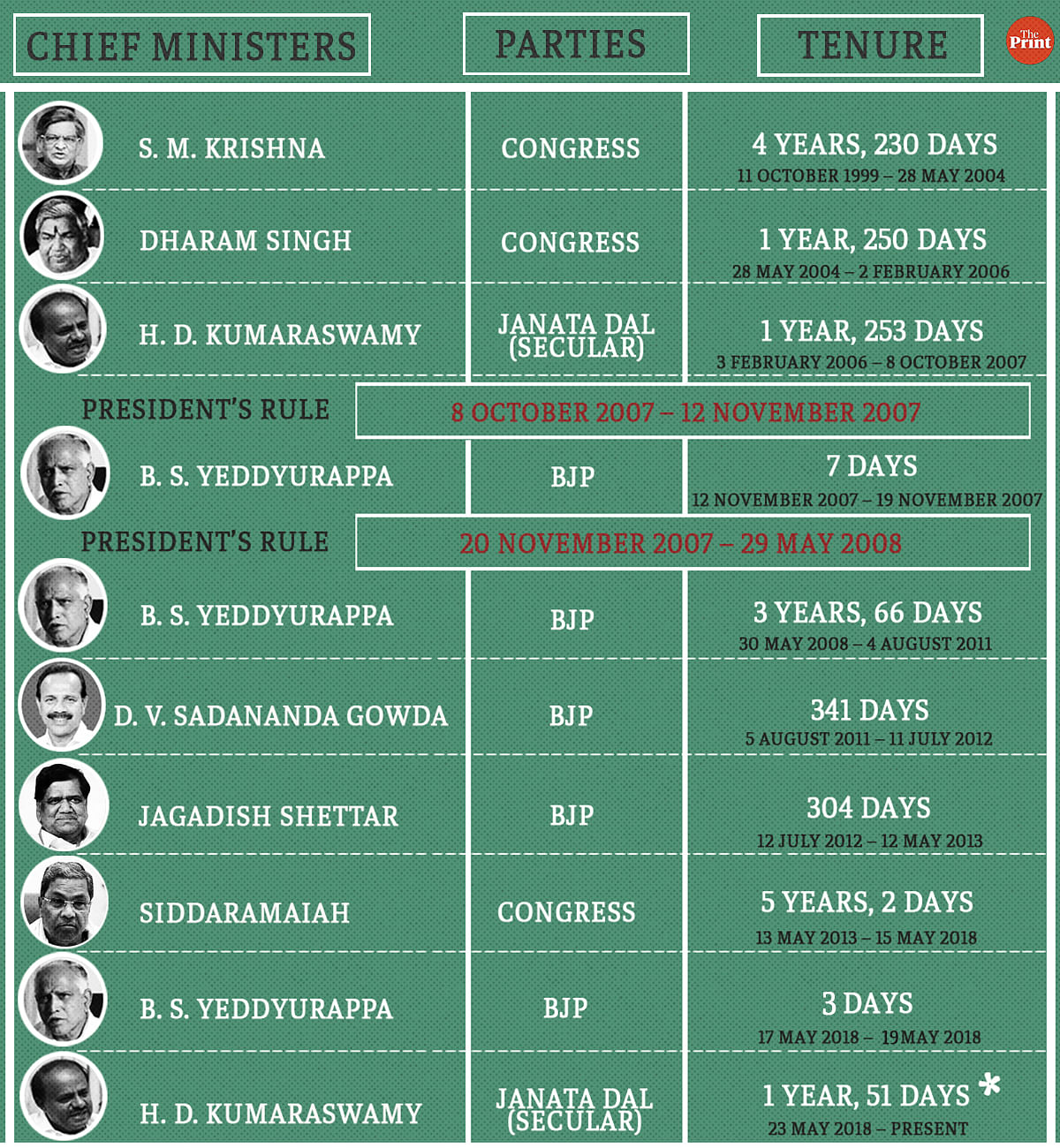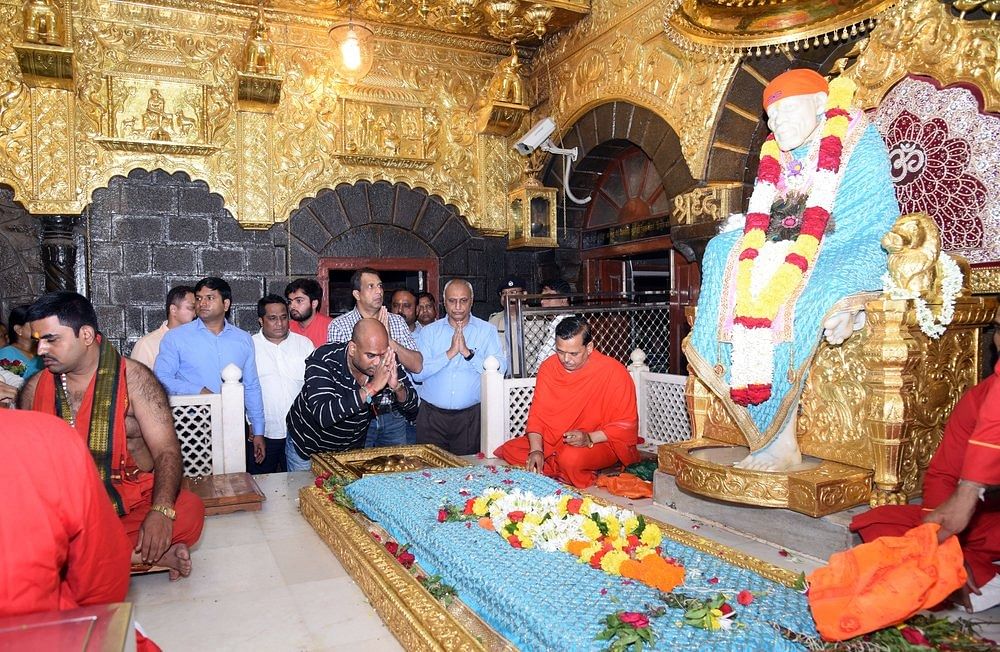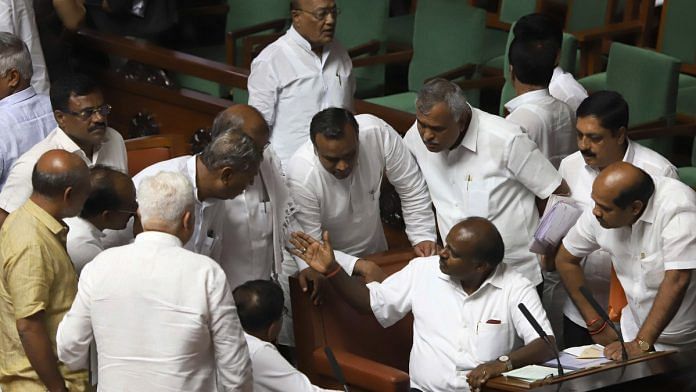Bengaluru: Since May 2004, Karnataka has had eight chief ministers, including one with a term of three days (B.S. Yeddyurappa of the BJP).
In nine years between 2004 and 2013, the state saw five chief ministers and one of the worst scams, the alleged Rs 35,000 crore illegal mining scandal, which forced the incumbent chief minister, Yeddyurappa again, to resign after a 38-month tenure.
Such frequent changes at the top may not have a direct correlation with the overall health of the economy but if a government’s full-time preoccupation is only to extend its longevity–as is the case with the current H.D. Kumaraswamy government–governance is bound to suffer.

As the Kumaraswamy administration deals with a series of defections from an already fragile alliance of two former rivals, the Janata Dal (Secular) and the Congress, resentment is on the rise among Kannadigas as they grapple with several crises.
The drought situation in most of the state’s 30 districts is grim. The traffic situation in Bengaluru, one of India’s showpiece cities and a hub of the IT industry, remains as chaotic as ever. Farmers are waiting for water from the Cauvery to irrigate their fields, but the government is not doing its part.
Amid a drought of governance, Kannadigas are finding themselves at sea.
‘Taken for a ride’
“What’s wrong if we take our legislators to a resort?” a spokesman of the Bharatiya Janata Party (BJP) said on a TV debate Sunday. “Are we seeing resort politics for the first time in Karnataka?”
The term ‘resort politics’ refers to a trend among political parties to herd their legislators into plush hotels amid fears of poaching.
The brazenness exhibited by the BJP spokesperson has defined the sordid political drama that has gripped Karnataka for the last 10 days, after over a dozen Congress and Janata Dal (Secular) legislators submitted their resignations to the assembly speaker.
If the resignations are accepted, the Kumaraswamy-led JD(S)-Congress government will slip into a minority.
“Let’s wait and watch. Are we sanyasis (to shun power)?” BJP state president B.S. Yeddyurappa said, barely concealing his glee, when asked last week if his party was planning to form the government again in light of the rebellion in the JD(S)-Congress ranks.
Hopping on and off chartered flights between Bengaluru and Mumbai, and checking in and out of swanky hotels, the rebel legislators are smug, knowing they are cocking a snook at the anti-defection law.

The BJP has been claiming all along that it had nothing to do with the rebellion, but a party worthy was caught on camera boarding a special flight with a rebel Congressman. But since brazenness is the order of the day, the Congress MLA stoutly denies he was in the company of a BJP leader.
Less than 12 hours earlier, this Congress rebel, MTB Nagaraj, the richest MLA in the country with declared assets of Rs 1,015 crore, had said he would withdraw his resignation after former chief minister Siddaramaiah and party trouble-shooter D.K. Shivakumar held lengthy conciliatory talks with him.
‘Can’t believe what is happening’
Meanwhile, on phone-in shows on Kannada television channels, there has been a stream of callers bad-mouthing the political class for reducing politics to a farce.
“Several districts are facing a severe drought, and here these fellows are enjoying five-star hospitality,” said one caller from a drought-prone town in north Karnataka, “We are being taken for a ride by those we voted for.”
He was referring to reports that all the three parties have herded their MLAs into five-star hotels and resorts in and around Bengaluru (apart from the 14 rebels in Mumbai).
In Bengaluru, a businessman from Singapore exclaimed, “I can’t believe what is happening.” He was meeting the president of the Federation of Karnataka Chambers of Commerce and Industry (FKCCI) on the day some of the rebel MLAs lodged in a plush Mumbai hotel landed in Bengaluru in two chartered planes to meet the speaker, seeking early acceptance of their resignations.
They drove from the HAL Airport to the Vidhana Soudha, the seat of the Karnataka legislature, at breakneck speed in nearly zero traffic, with police reportedly clearing the route, to keep their 6 pm appointment with the speaker.
“What could I tell the Singapore businessman? Do you think foreign investors would be interested in Karnataka in the face of all this political instability?” said FKCCI president C.R. Janardhana. “Is this the image we should be sending out to the world?”
There’s deep vexation in Karnataka over the instability that has gripped the H.D. Kumaraswamy-led coalition government in the state from the day it took office 14 months ago.
From farmers to industrialists to just about anyone, the common refrain is that Karnataka doesn’t deserve to suffer the political crisis a day longer.
The JD(S)-Congress government was born in a crisis, has lived through it since, and is on the verge of death now.
The disastrous consequences of a fractured mandate in the assembly elections last year were in evidence from the time Yeddyurappa, the leader of the single largest party, was invited to form the government. He lasted all of three days as chief minister, his exit brought by his inability to put together a majority.
Also read: Struggling in Karnataka, Congress banks on its go-to man DK Shivakumar yet again
Yeddyurappa didn’t have the numbers but neither did the Congress or the JD(S). The electorate may not have bargained for it but, in a cruel twist, the bitter rivals teamed up to stake claim to form the government. Kumaraswamy became the chief minister, thanks to Congress president Rahul Gandhi’s offer of support to the JD(S), which won less than half of the Congress’ tally, 37 against 78.
For Congress strongman and former chief minister Siddaramaiah, this was a bitter pill, and the forced cohabitation pleased none in either party.
They began fighting bitterly, resulting in rampant disgruntlement among MLAs, which the BJP allegedly tried to exploit by approaching them with offers of money and ministerships.
The rout of the coalition in the Lok Sabha elections made matters worse. The notorious “Operation Kamala”, through which the BJP had allegedly been attempting to destabilise the government, finally succeeded.
The coalition would have imploded anyway. The BJP only kept giving the push. The question mark over the Kumaraswamy government’s longevity did not appear to have disappeared anytime during all these months. The casualty: Governance.
‘Waiting for water’
Karnataka’s economic indicators may not be a good barometer of how poorly the state has been governed over the past 14 months. It is not a long period for poor governance to start reflecting in terms of economic indicators. After all, Karnataka has been one of the frontline industrialised states for decades.
The state ranks fifth in contribution (7.52 per cent) to India’s GDP, behind Maharashtra, Tamil Nadu, Uttar Pradesh and Gujarat. Karnataka grew at a healthy 9.6 per cent in 2018-19. It is among the largest recipients of foreign direct investment (FDI) among states.
Karnataka, or more specifically Bengaluru, is said to be among the top five R&D ecosystems in the world, and second fastest-growing ecosystem for start-ups.
‘Several districts are facing a severe drought, and here these fellows are enjoying five-star hospitality. We are being taken for a ride by those we voted for.’
Impressive numbers no doubt, but one-fifth of the state’s population is still reportedly poor. Consumption inequality is among the highest in the country and job creation among the slowest. Its Human Development Index rank was 12 in 2017, while, among its southern peers, Kerala ranks first and Tamil Nadu seventh.
“Political instability certainly affects administration,” said former Karnataka chief secretary Dr A. Ravindra.
“Work slows down, decisions are not taken,” he added, “Such instability also projects a negative image of the government in the public eye, and reflects poorly on the democratic system.”
He traced the roots of this instability in Karnataka to the decline of the Congress. “Barring the communists, all other parties are, in a way, offshoots of the Congress. As long as there was one strong party, there was stability,” he said.
According to him, it is time serious thought is given to introducing reforms so that elected representatives behave with a greater sense of responsibility and governments are not jettisoned midway through their tenures.
Darshan Puttannaiah, a software engineer turned farmers’ leader from the Cauvery belt, described the impact of the instability on farmers.
“Farmers were waiting for long for the KRS (Krishna Raja Sagara) Dam to receive water (from rain). Now that the level has touched 90 feet, water can be released for irrigation,” he said, “But for that to happen, the government has to approach the Cauvery Water Management Board (which manages the distribution of Cauvery waters). If the government is struggling to stay afloat, our needs are not a priority.”
“Whether we like it or not, the elections threw up a fractured verdict. But once the Congress and the JD(S) came together to form the government, they needed to realise that they have to hang in there for five years,” he added, “What we are seeing now is obnoxious.”
An absurd idea
As many as 156 of Karnataka’s 176 talukas have reportedly been declared drought-hit, but a concrete plan to overcome the drinking water crisis is nowhere in sight.
Instead, the government is proposing absurd projects like bringing water from the Sharavathi river, over 400 km away, to address the drinking water needs of Bengaluru. Water has to be lifted about 1,500 ft above sea level if this has to become a reality.
FKCCI chief Janardhana said while Karnataka’s economic indicators may be impressive, “it is despite and in spite of politicians”. “Our bureaucrats are doing a fine job,” he added.
He cites as an example the new industrial policy, a version of which will replace the 2014-2019 document in September.
“An excellent new policy document is ready after three rounds of consultations with us. But execution is critical,” he said. “If there is a change in government now, we don’t know what happens to the policy.”
Revathy Ashok, CEO of Bangalore Political Action Committee (B-PAC), a non-partisan citizens’ group that aims to improve governance in the city, focusing on good practices and improving the quality of infrastructure, said “long-term actions will get postponed in a situation of political instability”.
“There are big projects like suburban rail, waste management and lake rejuvenation that are complex,” she added, “They require mindspace. If a new government takes office, there will be fresh evaluation of projects and bureaucratic changes can’t be ruled out. Learning has to begin afresh and precious time is lost.”
B-PAC, she said, considers infrastructure the biggest casualty of instability. “Bengaluru, which has a prime position in the country, is suffering as infrastructure is not keeping pace,” she added.
“There is deep frustration over travel times and traffic congestion. The city has many firsts to its credit and the Congress-JD(S) should have put their best foot forward,” Revathy said.
But do Bengaluru and Karnataka face the risk of investors moving away because of political instability? Unlikely, said Professor Narendar Pani of the Bengaluru-based National Institute of Advanced Studies (NIAS), a school of research.
While not entirely ruling out the impact of political instability on a region’s attraction, he said if investors were to turn their backs on a state or the country, there would have to be far more serious concerns.
For instance, Pani added, for FPIs (foreign portfolio investments) and FIIs (foreign institutional investors), the hike in surcharge on the “super rich” proposed in the Union Budget is a bigger risk than political instability.
Dr M.G. Chandrakanth, director of the Bengaluru-based research school Institute for Social and Economic Change, concurred. “It is not that a continued period of stability necessarily ensures good governance,” he said.
With the rebel MLAs determined to stick to their resignations, it will be nothing short of a miracle if the Kumaraswamy government survives.
The BJP is confident of forming the next government but its stability will again be dictated by how it fulfils the aspirations of the rebel Congress and JD(S) MLAs.
BJP sources say at least two of the rebels have been promised that their sons will be given party tickets to contest byelections, while others have been offered ministerships once they are re-elected.
Also read: Chennai water crisis is a man-made disaster. Other Indian metros may suffer the same fate




Democracy is crying loud, there is complete absence of governance, huge money is going in to resorts with nobody around to rescue the state. How long this painful situation can be allowed to continue and what is the precise role of the CENTRE, whatsoever party is in power? The larger question is of equity, of relevance, of proprietary and of decency. Even if the state govt falls, which appears imminent, and BJP forms the govt, for which it appears desperate – what is in store ? Will it last long and will it be able to deliver on governance?
Nothing is coming out from any quarter and all of us are just witnessing the great drama for the next and then next and then next scene. Is there no solution that our democracy can offer? Is democracy only and solely a play of game of numbers – the numbers and numbers and numbers with whatever means?
In fact, the situation will remain fragile whether this govt survives or another is formed. The govt will remain in ICU struggling for the next breathe. Can the state and for that matter the Centre afford to let the crisis continue for eternity. And who are to gain out of this – the lawmakers of all the parties enjoying five star luxury with perhaps each of them wanting a flesh of his share, of a berth in ministry or head of a corporation or committee.
Modi govt with an avowed objective of a clean administration with all unclean lawmakers is just being seen as either an onlooker or having a tacit ambition of grabbing another state into party’s fold. But at what cost? Do each of the stakeholders of the crisis feel that the public is a deaf and dumb entity and can be taken for granted? Do we forget that the electorates are the ultimate stakeholders and we don’t have the luxury of denying a decent solution of the crisis.
How can anyone involved submit so loudly that there is nothing wrong keeping lawmakers in five star captivity ….. how shameless we have become to swallow everything put forward and be a silent spectator?
It is high time that whatever be the result of the Confidence Motion, Centre should act, put the state under President rule and arrange a fresh mandate from the people!